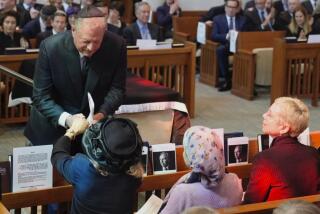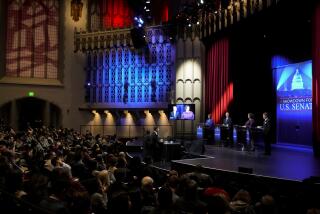Gore, Bradley Clash Over Who Is Better Leader
- Share via
DURHAM, N.H. — In a lively debate that focused heavily on elements of style, Al Gore and Bill Bradley traded barbs Wednesday night over who would be the stronger, more decisive leader as president.
Vice President Gore portrayed Bradley as too intellectually removed to deal with the real-world problems a president would face, approaching office as “an academic exercise.” The former New Jersey senator suggested Gore is too timid to take on major issues confronting the nation and too deep in “the Washington bunker” to shake up the political status quo.
While renewing familiar arguments over health care, gun control and the conduct of their respective campaigns, the two did manage to plow some new policy ground. Both Democratic candidates said they would require any appointee to the Joint Chiefs of Staff to support a change in policy to allow gays to serve openly in the military.
For the most part, however, the hourlong session held at the University of New Hampshire revolved less around specifics and more around the question posed by Bradley: Who could provide the leadership “to get big things done”?
The evening found both candidates forced to defend their lengthy records in public office as well as certain controversial votes. In addition, Gore was repeatedly forced to defend both the personal actions and public record of President Clinton.
Each candidate confessed to making mistakes, although Bradley defended some more politically touchy Senate votes that Gore criticized.
Gore said he was wrong to raise campaign contributions from his vice presidential office--part of the 1996 Clinton-Gore reelection fund-raising investigation--and later suggested his willingness to own up to the mistake was a sign of leadership.
“I think our country deserves a president who, when he makes a mistake, is willing to acknowledge it,” Gore said. “. . . The presidency is not an academic exercise. It’s not an extended seminar of theory. It has to be a daily fight for the best interests of the American people.”
Bradley, responding to Gore’s challenge in offhand fashion, suggested he once erred by opposing Alan Greenspan’s initial appointment as chairman of the Federal Reserve.
But for the most part, Bradley shunned theatrics. Indeed, throughout the evening, Bradley treated Gore almost dismissively, repeatedly addressing the vice president as “Al.” Gore, in turn, addressed Bradley as “Bill.”
“To a very large extent, Bradley was calling the shots,” said Susan Estrich, a USC law professor and Democratic activist, who is neutral in the party primary.
With evident disdain, Bradley once more rejected as a “ploy” the vice president’s suggestion they cease their TV ads in favor of a series of debates. And he repeatedly asserted that Gore lacks the political courage to push through major policy changes each supports, such as universal health care and stricter gun controls.
Bradley also delivered one of his sharpest attacks on Clinton and his tempestuous tenure as president.
“I think that the main objective in the last seven years in the White House has been political survival,” Bradley said.
Addressing Gore, he continued, “The reality is the Democratic Party shouldn’t be in the Washington bunker with you. The Democratic Party should be thinking big things . . . and we should have the leadership to get behind it and make it happen.”
But Bradley was also forced to defend himself, addressing everything from his dry personal mien--”I am not aloof”--to whether he is willing to engage in the rough-and-tumble of partisan politics. “I’ve never shied away from politics when it came to getting something done,” Bradley said.
Asked by moderator Peter Jennings of ABC News whether his rival had ever mischaracterized his record, Gore balked at the question. Hemming and hawing at some length, the vice president replied, “I haven’t complained about anything . . . I won’t accuse him of that.” But Bradley responded vigorously and with passion. He accused Gore of deliberately misstating the effect his health care plan would have on minorities. “That I would go out and hurt African Americans and Latinos consciously as a part of policy really offended me,” Bradley said.
Gore denied the charge, but in an appearance in Pasadena in November, he said that African Americans and Latinos, who are more likely to use Medicaid, might not be able to afford medical insurance under Bradley’s health plan.
For his part, Gore spent much of the evening defending Clinton and his record on everything from national forest policy to the Monica S. Lewinsky scandal to his dealings with Russia. But Gore also took credit, as he has more frequently of late, for the positive accomplishments of the Clinton administration, including record economic growth, a drop in crime and a decline in the federal welfare rolls.
Given a chance to directly question his rival, Gore asked Bradley whether he now considered his 1996 vote against welfare reform to be a mistake. In the same vein, he asked whether Bradley also regretted his 1991 vote against the Persian Gulf War and his support for the Reagan administration budget cuts of 1981.
Unfazed by Gore’s invitation for self-criticism, Bradley defended each of those votes. He said the vote for budget cuts was a vote for fiscal conservatism; he said he favored sanctions against Iraq, with the use of force in the Persian Gulf reserved as an option; he said the welfare reform bill, for all its success in trimming public assistance rolls, has failed to address the “deep poverty” that still exists.
Earlier Wednesday, before their debate, the two candidates touted their latest endorsements: Gore by Sen. Edward M. Kennedy (D-Mass.) and Bradley by a group of more than 600 pro-choice women.
“No one has fought harder or been more effective or a stronger voice for our Democratic priorities than Al Gore,” Kennedy said at a Boston rally. “Al Gore has the ability . . . , the experience and the vision to lead this nation wisely and well.”
While Kennedy eschewed direct attacks on Bradley, he took up one of Gore’s thematic assaults on the former senator for retiring from Congress soon after Republicans took control in 1995. “Al Gore was never a quitter. He never walked away. He never turned his back. He never stopped fighting,” Kennedy said.
Bradley, meanwhile, appeared at a noon rally in Newmarket, N.H., to tout the endorsement of the pro-choice New Hampshire women. “This is an issue that you cannot straddle,” Bradley said. “I know where I stand on this issue. I have always been pro-choice and I always will.”
Other speakers asserted that Gore’s pro-choice record is less clear, noting that, as a Tennessee congressman in the late 1970s and early 1980s, Gore voted with the National Right to Life Committee 84% of the time. More recent votes have been in line with the pro-choice position. Still, Mary Rauh, a Democratic activist and former national Planned Parenthood board member, said, “I don’t trust him.”
Times staff writers Faye Fiore and Janet Wilson contributed to this story.
More to Read
Get the L.A. Times Politics newsletter
Deeply reported insights into legislation, politics and policy from Sacramento, Washington and beyond. In your inbox twice per week.
You may occasionally receive promotional content from the Los Angeles Times.










